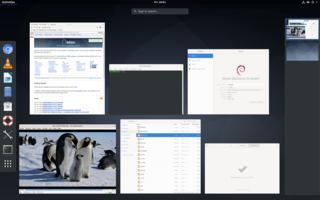
Bruce Perens is an American computer programmer and advocate in the free software movement. He created The Open Source Definition and published the first formal announcement and manifesto of open source. He co-founded the Open Source Initiative (OSI) with Eric S. Raymond. Today, he is a partner at OSS Capital.

Debian, also known as Debian GNU/Linux, is a Linux distribution composed of free and open-source software, developed by the community-supported Debian Project, which was established by Ian Murdock on August 16, 1993. The first version of Debian (0.01) was released on September 15, 1993, and its first stable version (1.1) was released on June 17, 1996. The Debian Stable branch is the most popular edition for personal computers and servers. Debian is also the basis for many other distributions, most notably Ubuntu.

GNU is an extensive collection of free software, which can be used as an operating system or can be used in parts with other operating systems. The use of the completed GNU tools led to the family of operating systems popularly known as Linux. Most of GNU is licensed under the GNU Project's own General Public License (GPL).

Ian Ashley Murdock was an American software engineer, known for being the founder of the Debian project and Progeny Linux Systems, a commercial Linux company.

A Linux distribution is an operating system made from a software collection that is based upon the Linux kernel and, often, a package management system. Linux users usually obtain their operating system by downloading one of the Linux distributions, which are available for a wide variety of systems ranging from embedded devices and personal computers to powerful supercomputers.
Progeny Linux Systems was a company which provided Linux platform technology. Their Platform Services technology supported both Debian and RPM-based distributions for Linux platforms. Progeny Linux Systems was based in Indianapolis. Ian Murdock, the founder of Debian, was the founder and chairman of the board. Its CTO was John H. Hartman, and Bruce Byfield was marketing and communications director.

Advanced Package Tool, or APT, is a free-software user interface that works with core libraries to handle the installation and removal of software on Debian, Ubuntu, and related Linux distributions. APT simplifies the process of managing software on Unix-like computer systems by automating the retrieval, configuration and installation of software packages, either from precompiled files or by compiling source code.

The Linux Standard Base (LSB) is a joint project by several Linux distributions under the organizational structure of the Linux Foundation to standardize the software system structure, including the Filesystem Hierarchy Standard used in the Linux kernel. The LSB is based on the POSIX specification, the Single UNIX Specification (SUS), and several other open standards, but extends them in certain areas.

MEPIS was a set of Linux distributions, distributed as Live CDs or DVDs that could be installed onto a hard disk drive. MEPIS was started by Warren Woodford and the eponymous company MEPIS LLC.

Canonical Ltd. is a UK-based privately held computer software company founded and funded by South African entrepreneur Mark Shuttleworth to market commercial support and related services for Ubuntu and related projects. Canonical employs staff in more than 30 countries and maintains offices in London, Austin, Boston, Shanghai, Beijing, Taipei, Tokyo and the Isle of Man.
Technical variations of Linux distributions include support for different hardware devices and systems or software package configurations. Organisational differences may be motivated by historical reasons. Other criteria include security, including how quickly security upgrades are available; ease of package management; and number of packages available.

Linux is a family of open-source Unix-like operating systems based on the Linux kernel, an operating system kernel first released on September 17, 1991, by Linus Torvalds. Linux is typically packaged in a Linux distribution.

Linux Mint is a community-driven Linux distribution based on Ubuntu, bundled with a variety of free and open-source applications. It can provide full out-of-the-box multimedia support for those who choose to include proprietary software such as multimedia codecs.
GNU variants are operating systems based upon the GNU operating system. According to the GNU project and others, these also include most operating systems using the Linux kernel and a few others using BSD-based kernels.
The DCC Alliance (DCCA) was an industry association designed to promote a common subset of the Debian GNU/Linux operating system that multiple companies within the consortium could distribute. It was founded by Ian Murdock in 2005 and was wound up in 2007.

Kali Linux is a Debian-derived Linux distribution designed for digital forensics and penetration testing. It is maintained and funded by Offensive Security.

Debian releases do not follow a fixed schedule. Recent releases have been made roughly biennially by the Debian Project.

PureOS is a Linux distribution focusing on privacy and security, using the GNOME desktop environment. It is maintained by Purism for use in the company's Librem laptop computers as well as the Librem 5 smartphone.
gLinux is a Debian Testing-based Linux distribution used at Google as a workstation operating system. The Google gLinux team builds the system from source code, introducing their own changes. gLinux replaced the previously used Ubuntu-based distribution, Goobuntu.












